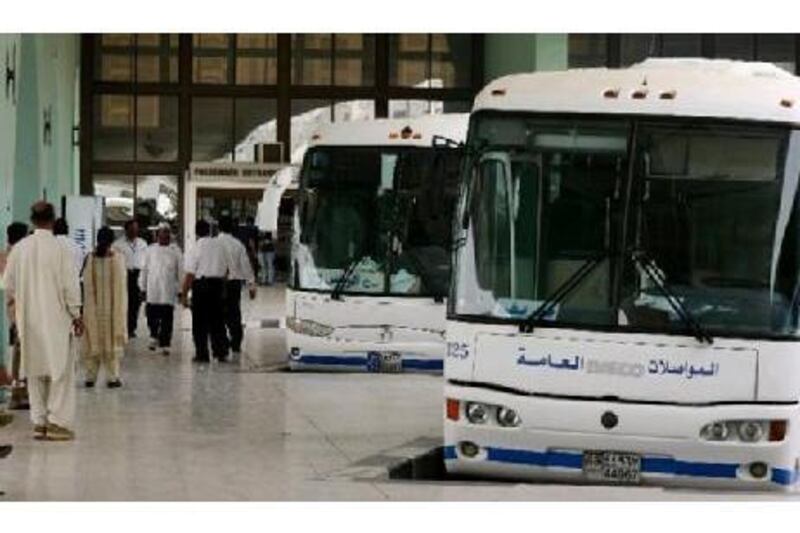On location: Bus terminus, Muroor Road, Abu Dhabi.
The arrival of the paperboy creates a stir every morning at the taxi terminal at the central bus station on Muroor. The drivers of the trans-emirate cabs have some time to kill, and they want something to read.
EP Moideen, a stout, bespectacled Indian in his 60s, is poring over his favourite Malayalam newspaper. "We are waiting for the police to take attendance," he explains. When the Abu Dhabi police officer arrives at 9am, he begins reading off five-digit numbers. Mr Moideen is the third driver to raise his hand and reply with an "aywa". The officer is calling out the tag numbers of taxis in order of seniority, the process that determines who gets to accept a farefirst. As one of the oldest drivers, Mr Moideen has a low number, which he uses to his advantage.
The bartering begins as he takes out a piece of paper. Drivers with earlier places in the departure order trade with the younger drivers. In this crowd, younger is relative;the youngest drivers appear to be in their late40s. Mr Moideen exchangesspots with number 30. When asked what he received in exchange for his pole position, he looks over the rims of his spectacles and says only, "I may have some jobs on Muroor, so I can wait."
The Pakistani man in charge of keeping order in the ranks calls himself "Master". As drivers nap in the shade of willow trees, awaiting their turn to drive to Al Ain, Dubai or Sharjah, Master, also known as Hazzrat Khan, makes sure drivers do not jump the queue. The taxi terminal makes up one- half of the capital's central bus station, which opened in 1982. The taxi side is the past. The aging gold-and-white minibuses that operate outof the station contrast with the gleaming red coaches from Dubai and Sharjah and the new, air-conditioned, blue-and-white city buses. Few people use the taxis during an average day.
The bus terminal towers over the low-slung structures of the taxi area. The complex'sinterior isnearly devoid of passengers - most seem content to wait outside on benches - but the terminal is far from empty. As well as being a transit hub, this is a hot lunch spot for people who work nearby, a meeting place for friends, and, for some, a quiet place to sit and read. Ajidh Nair is reading a pamphlet titled Do you want to be among the privileged?He sells credit cards and loans for a local bank, and to save money he usesthe bus to travelhis sales route.
A command centre, shaped like a flying saucer, hovers over the bus traffic. From its portholes Adbulrahman Mohammed monitors the comings and goings of traffic and people. But now, he is eating a sandwich. In the main bus terminal, Youssef Benzaimia is doing brisk business during the lunchtime rush at Rawabi al Sham Pastries and Restaurant. He dishes out tea and falafel sandwiches to a crowd of tourists, commuters and terminal employees.
Mr Mohammed is there every day. "This is the best for me, because my break is so short," he says between bites. He always orders the falafel. "There is also meat, but they make it in the morning, so by midday it may be a problem." Mr Benzaimia is a Moroccan in his 20s with a quick smile and a talented tongue. Asked if he speaks English, he flashes a grin and says: "English, French, Arabic, no problem." He also claims to speak a little German.
The energetic deli worker loves to talk. "I like meeting people from other countries and traditions. I always ask where they are from." When he is not chatting with customers, he's messaging his friends back in Morocco. Mr Benzaimia has to step away to answer a tentative query of "pizza?" from a mother with a teenage son. She leaves with a falafel sandwich and couple of Mountain Dews. Mr Benzaimia has met people from 45 different countries in his two years in the capital so far, and he keeps noteson all of them. "Today I met an American from Nevada, a British, Welsh and a Scot. My dream is to travel."
The most interesting encounter, he says, was the rugby player from Fiji. He, too, ordered the falafel. After the busy lunchtime service, Mr Benzaimia is left to wait for his favourite part of the day - 7pm, when he usually meets his girlfriend on the Corniche for coffee. The terminal building is emptier in the evening, but far from quiet. A group of old men are making a commotion on the benches, and their voices carry throughout the empty hall. They are Somalis, and this is their haven."We meet every night to discuss news from home," says a man who identifies himself as Mr X Y from Somaliland, with more than a little sass. "Why should I give my name? I am old. If my name appears in the paper, the women will not chase me."
Dressed in a dark grey safari shirt, Mr X Y stands out among the group of men,most of whom wear khandouras. "Some of us listen to the BBC, some read on the internet;we come here to trade what we have heard about what is going on back home." The bus station may seem like an odd location to host a daily gathering, but they like the obscurity. "The families are at home, the children are studying, so we come here."






